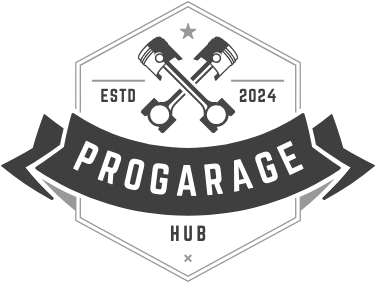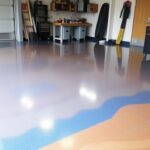Getting an epoxy garage floor can make your space last longer and look better. But, you might wonder how much it will cost. This guide will help you understand the costs by looking at different factors. We’ll give you all the details you need to decide wisely.
Key Takeaways
- Epoxy garage floor costs can vary a lot, from $3 to $12 per square foot. This depends on things like how well the surface is prepared, the quality of materials, and how much labor costs.
- Doing it yourself can save up to 50% of the cost. But, you need to prepare the surface well and pay attention to the details.
- Getting the surface ready right is key. This includes cleaning and fixing the concrete. It can be a big part of the total cost.
- Bigger garages and more complex designs will cost more. This is because they need more labor and materials.
- Looking for ways to save money, like buying in bulk or doing it during slow times, can help control costs.
Understanding Garage Floor Epoxy and Its Benefits
Epoxy coatings are a top pick for garage floors. They offer durability, protection, and great looks. There are many types of epoxy, each with its own benefits. Knowing about these can help homeowners choose the best for their garage.
Types of Epoxy Coatings Available
There are three main types of epoxy for garage floors: water-based, solvent-based, and 100% solid. Water-based epoxies are good for indoor use because they have low odor and are easy to apply. They’re also eco-friendly.
Solvent-based epoxies are great for busy areas because they’re very durable and resistant to chemicals. The 100% solid epoxies are the most durable. They last a long time and protect well against wear, impact, and spills.
Advantages of Epoxy Flooring
- Enhanced durability and resistance to wear, abrasion, and impact
- Easy maintenance and cleaning
- Attractive, customizable appearance with a wide range of color and finish options
- Improved traction and slip resistance, reducing the risk of accidents
- Chemical and stain resistance, protecting against oil, grease, and other spills
Durability and Longevity Factors
The life of an epoxy garage floor depends on the epoxy quality, surface prep, and how it’s applied. High-quality epoxy can last for years. With the right care and recoating, it will keep looking and performing well.
Average Cost Breakdown for Epoxy Garage Floors
Homeowners often wonder about the cost of epoxy garage floors. The price can change a lot based on several things. These include the garage size, epoxy quality, and how much work the floor needs. Let’s look at what usually costs for epoxy garage floors.
Epoxy Garage Floor Pricing
The average cost of epoxy flooring for a two-car garage is between $1,500 and $3,000. This price includes materials, labor, and extra costs for the project. But, the epoxy garage floor pricing can change for a few reasons:
- Garage size: Bigger garages need more materials and work, making the cost go up.
- Epoxy quality: Better, commercial-grade epoxy costs more than DIY options.
- Surface preparation: Floors that are badly damaged or uneven might need extra work, raising the price.
For example, a basic epoxy coating for a 400-square-foot garage might cost $1,500 to $2,000. But, a more advanced, multi-layer system for the same size could be $2,500 to $3,500.
| Garage Size | Average Epoxy Flooring Cost |
|---|---|
| 400 sq. ft. (2-car garage) | $1,500 – $3,500 |
| 600 sq. ft. (3-car garage) | $2,500 – $5,000 |
| 800 sq. ft. (4-car garage) | $3,500 – $7,000 |
Knowing what affects epoxy garage floor pricing helps homeowners plan better. They can make smart choices for their garage floor makeover.
How Much to Epoxy Garage Floor: Complete Price Analysis
Figuring out the cost to epoxy a garage floor involves looking at several key factors. These include labor, installation fees, material costs, and what equipment you need. The final price can change a lot based on your project’s details.
Labor Costs and Installation Fees
Labor costs for epoxying a garage floor can be between $3 and $7 per square foot. This depends on how complex the job is and the installer’s experience. Professionals usually charge more, while DIY folks might save money.
Also, getting the surface ready for epoxy can cost an extra $1 to $3 per square foot. This step is important for a good epoxy job.
Material Expenses and Quality Grades
Epoxy material costs can vary a lot, from $30 to $100 per gallon. The quality and what it does affect the price. Better epoxy lasts longer, looks good, and resists chemicals, but it’s pricier.
Other things like the garage’s size, how many coats you need, and any special additives also play a part in material costs.
Additional Equipment Requirements
- Epoxy Concrete Floor Coating – $50 to $200 per gallon
- Floor Grinder – $200 to $500 for rental
- Concrete Sealers and Primers – $20 to $50 per gallon
- Personal Protective Equipment (PPE) – $50 to $100
Special equipment like floor grinders, sealers, and safety gear can increase your costs. Knowing these extra costs helps plan your budget better.
By looking at all the costs, homeowners can get a clear picture of what they’ll spend on epoxying their garage floor. This way, they can plan a successful and affordable project.
DIY vs Professional Installation Cost Comparison
Choosing between DIY epoxy flooring and professional epoxy installation is a big decision. The cost is a key factor for many homeowners. While DIY epoxy garage floor might seem cheaper at first, there are other things to think about.
The DIY route means spending a lot on tools and materials. You’ll need epoxy coatings, primers, sealers, and special tools like grinders and rollers. Also, getting the surface ready is hard work and takes a lot of time.
Professional epoxy installation costs more at first, but it has its benefits:
- Experts ensure a perfect, lasting finish
- They handle dangerous materials and clean up
- There’s a warranty for the work and materials
- It’s often faster and more efficient
Homeowners should weigh the costs of DIY vs professional epoxy garage floor installation. Think about both the initial costs and the long-term benefits of each choice.
“The key to a successful epoxy garage floor project lies in understanding the true cost implications of each option, whether you choose to tackle it yourself or enlist the help of professionals.”
Factors Affecting Garage Floor Epoxy Pricing
Several key factors can impact the cost of epoxy garage floor installation. Knowing these can help homeowners budget and plan their project well.
Garage Size and Layout Considerations
The size and layout of your garage affect epoxy pricing. Larger garages need more materials and labor, raising costs. Garages with complex shapes or levels also cost more due to the installation’s complexity.
Surface Preparation Requirements
Proper surface preparation is crucial for epoxy floor installation. The condition of your garage floor greatly influences the cost. Floors needing extensive cleaning, grinding, or repair cost more than those with minimal needs.
Regional Price Variations
Epoxy pricing varies by location. Labor costs, material availability, and demand in your area can change prices. Homeowners in expensive areas may pay more than those in cheaper regions.
| Factors | Impact on Epoxy Pricing |
|---|---|
| Garage Size | Larger garages require more materials and labor, leading to higher costs. |
| Surface Preparation | Floors with extensive cleaning or repair needs incur additional expenses. |
| Regional Variations | Pricing can differ based on local labor costs, material availability, and demand. |
Understanding these factors helps homeowners estimate epoxy garage floor costs. This knowledge ensures a successful and cost-effective installation.
Cost-Saving Tips for Garage Floor Epoxy Projects
Installing an epoxy garage floor can be a big change, but it’s key to keep costs down. Luckily, there are ways to save money without sacrificing quality. Here are some tips to help you get a budget-friendly garage epoxy without spending too much.
- Time it right: Plan your project during the off-season or when contractors are less busy. This can lead to big cost-effective epoxy installation savings.
- DIY surface preparation: Spend time making your garage floor ready. With the right tools and effort, you can do most of the prep work yourself.
- Source materials strategically: Look for the best deals on epoxy products and other materials. Buying in bulk or using special offers can save you money.
- Consider budget-friendly epoxy options: While top-quality epoxy coatings are durable, there are cheaper options that still look great and protect your floor.
- Prioritize critical areas: If you’re on a tight budget, focus on the most used parts of your garage. Use a less expensive option for the rest of the floor.
By using these tips, you can get the benefits of an epoxy flooring savings without sacrificing quality. With a bit of creativity and planning, you can have a beautiful, budget-friendly garage epoxy that fits your budget.

Long-Term Value and Return on Investment
Choosing an epoxy garage floor is more than a cosmetic choice. It’s a smart move that can bring big benefits over time. Homeowners can see the value in it, beyond the initial cost.
Maintenance Costs Over Time
Epoxy floors are known for their durability and low upkeep needs. They last longer than other floors, saving you money. The garage epoxy maintenance costs are often lower, making it a smart choice for the long haul.
Property Value Impact
A top-notch epoxy floor can boost your home’s value. Its sleek look is attractive to buyers. Studies show that property value epoxy flooring can raise your home’s worth, making it a smart investment.
The epoxy floor ROI can be huge, making the initial cost worth it. Knowing the upkeep and value benefits helps homeowners make a choice that fits their goals and budget.
“Investing in a high-quality epoxy floor for your garage is a smart decision that can pay dividends for years to come. The low maintenance requirements and potential increase in property value make it a truly worthwhile investment.”
Common Hidden Costs and How to Avoid Them
When planning an epoxy garage floor project, remember to budget for more than just the obvious costs. Hidden expenses can quickly increase, affecting your initial budget. Knowing about these costs helps you avoid them and stay on track with your project.
One common hidden cost is moisture mitigation. Too much moisture can harm the epoxy’s adhesion and lifespan. You might need to test and treat the concrete, adding to your costs.
- Include the costs of moisture testing and any needed treatments in your budget.
- Get advice from a pro to find the best moisture control for your garage.
Another surprise expense can be repairs or surface prep. Cracks, chips, or uneven floors may need fixing before applying epoxy. These steps can increase labor and material costs.
- Check your garage floor for any repairs or prep work you might need.
- Talk to your epoxy installer about what surface prep is required.
Lastly, don’t forget about the cost of specialized equipment. Things like floor grinders or epoxy tools might not be in your initial budget. Make sure to include these in your planning.
“Avoiding hidden costs is key to ensuring your garage floor epoxy project stays on budget and delivers the long-lasting, high-quality results you desire.”
By planning for these common hidden costs, you can avoid unexpected expenses. This way, your epoxy garage floor project will stay within budget and meet your expectations.

Conclusion
Getting an epoxy garage floor is a smart move that can change your garage’s look and use. Think about the cost, including labor and materials, and how prices vary by area. This way, you can choose what fits your budget and what you want for your garage.
Consider the benefits of an epoxy floor, like it lasting longer, being easy to clean, and maybe even increasing your home’s value. Look for ways to save money and watch out for extra costs. This will help you get the most out of your epoxy garage floor project.
Choosing to epoxy your garage floor is a personal choice. But with the right info and planning, you can find a good fit for your needs and budget. Whether you do it yourself or hire someone, the benefits of an epoxy floor are worth it for your home and lifestyle.
FAQ
How much does it cost to epoxy a garage floor?
What factors affect the cost of epoxy garage floors?
Is it cheaper to do a DIY epoxy garage floor or hire a professional?
FAQ
How much does it cost to epoxy a garage floor?
The cost to epoxy a garage floor varies. It can range from to per square foot. This depends on the garage size, epoxy quality, and whether you do it yourself or hire a pro.
What factors affect the cost of epoxy garage floors?
Several factors influence the cost. These include the garage size and layout, the floor’s current state, and the epoxy type and quality. Also, the surface prep needed and whether you install it yourself or hire a pro matter.
Is it cheaper to do a DIY epoxy garage floor or hire a professional?
DIY epoxy floors can save money, with costs from
FAQ
How much does it cost to epoxy a garage floor?
The cost to epoxy a garage floor varies. It can range from $3 to $12 per square foot. This depends on the garage size, epoxy quality, and whether you do it yourself or hire a pro.
What factors affect the cost of epoxy garage floors?
Several factors influence the cost. These include the garage size and layout, the floor’s current state, and the epoxy type and quality. Also, the surface prep needed and whether you install it yourself or hire a pro matter.
Is it cheaper to do a DIY epoxy garage floor or hire a professional?
DIY epoxy floors can save money, with costs from $1 to $5 per square foot. Yet, hiring a pro for $3 to $12 per square foot can offer a better finish. It might be worth it for some homeowners.
What are the long-term maintenance costs for an epoxy garage floor?
Epoxy floors need little upkeep over time. They require occasional cleaning and touch-ups or resealing every few years. This makes epoxy a cost-effective choice for garage floors.
How does the size of my garage affect the cost of epoxying the floor?
Garage size is a big factor in epoxy floor costs. Bigger garages need more materials and labor. This increases the total cost compared to smaller garages.
to per square foot. Yet, hiring a pro for to per square foot can offer a better finish. It might be worth it for some homeowners.
What are the long-term maintenance costs for an epoxy garage floor?
Epoxy floors need little upkeep over time. They require occasional cleaning and touch-ups or resealing every few years. This makes epoxy a cost-effective choice for garage floors.
How does the size of my garage affect the cost of epoxying the floor?
Garage size is a big factor in epoxy floor costs. Bigger garages need more materials and labor. This increases the total cost compared to smaller garages.





